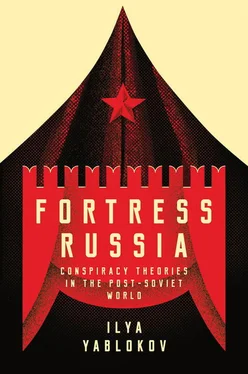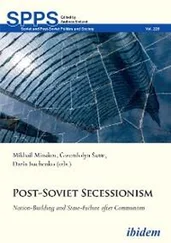When accepting the leadership of the party, Putin emphasized that in the previous century, ‘our Motherland passed through many convulsions’, such as economic ‘shock therapy’, territorial collapse and moral decay. By contrast, in the 2000s his government had provided ordinary Russians with economic stability, agricultural successes and improved social support (Putin, 2007b). This demonization of the 1990s – first featured in Putin’s landmark speech in 2005 – not only reminded Russian citizens about recent traumatic experiences, but it also served to define more clearly the main opponents of Putin and United Russia, now commonly called ‘Putin’s enemies’ ( vragi Putina ). In the words of pro-Putin politicians and intellectuals during the campaign, the ultimate goal of these people and organizations, backed by the West, was to restore a regime interested solely in national plunder and disintegration.
In 2006–7, pro-Putin intellectuals and spin doctors further elaborated narratives about how to define the enemies of Russia and Putin. By the time of the elections, the Evropa publishing house, which was closely affiliated with Pavlovskii, published two books which dealt with the ‘subversive Other’ in Putin’s Russia. One was focused on individuals, the other on organizations.
The first of these publications could not have been more explicit; its title was Vragi Putina ( Putin’s enemies ). Written by a group of pro-Kremlin journalists and published in November 2007, at the peak of the electoral campaign, it included stories about opposition politicians and oligarchs who had either left Russia to avoid arrest or, like Khodorkovsky, had been convicted. The second book, by a PR-specialist Maksim Grigor’ev, was titled Fake-struktury. Prizraki rossiiskoi politiki ( Fake-Structures: The Shadows of Russian Politics ). This focused on NGOs and various organizations which were opposed to the Kremlin. The author claimed that the declared goals and principles of these organizations were deceitful; in reality their sole aim was to undermine Russia by means of cooperation with American and European funding bodies (Grigor’ev, 2007). The publication of these books was widely advertised by the pro-Kremlin media as a newsworthy event. The authors were invited to give several interviews, which allowed them further to elaborate their arguments (Malysheva, 2007).
The overarching narrative of these publications was to make out that Putin and Russia were virtually the same thing. Therefore, any criticism of Putin and the existing political system could be interpreted as a hostile stance towards the nation. Pavlovskii noted in an interview given at this time at the Echo of Moscow radio station that the term ‘enemy’ helped to stress the difference in the political views of Putin and his opponents (Al’bats and Pavlovskii, 2007). Thus, the use of that term was justified because it made it clear, on the eve of the elections, who were the Kremlin’s allies and who were its opponents.
Vitalii Ivanov, deputy head of the pro-Kremlin Centre for Political Conjuncture ( Tsentr Politicheskoi Kon’iunktury ) and one of the pro-Kremlin spin doctors, wrote in the preface to Vragi Putina :
Putin’s regime carries out policies which respond to the aspirations of the nation, the policies which restore Russian power, consolidate the state, support domestic order, which correspond to our political traditions and strengthen patriotism…. It is not important why a person rejects Putin’s regime and becomes its enemy. It is important that, in the current situation, this person automatically becomes an enemy of the state and the nation, an enemy of our Motherland. (Danilin, Kryshtal’ and Poliakov, 2007, p. 6)
The central idea of Vragi Putina was to compare Putin to his ‘political enemies’ and demonstrate how ‘immoral’ these people were in comparison to the president. To do that, the authors assigned a cardinal sin to each of the ‘Putin enemies’. Boris Berezovskii was guilty of wrath, which pushed him into battle with Putin over returning control over the country to the people. Mikhail Kas’ianov, Russian prime minister from 2000 to 2004, and subsequently a staunch opposition leader, was accused of greed, since he preferred a luxurious lifestyle and foreign trips to dealing with ordinary Russians. The Yukos oil company’s owner Mikhail Khodorkovsky’s sin was the envy of Putin, which resulted, in the words of the authors, in him planning to dismantle Russia, destroy most of the population and give the country’s nuclear weapons to the Americans (pp. 53–4, 125, 183–4).
Fake-structures had a different angle: it developed the idea that Russian NGOs were a tool of foreign-government subversion, which contributed to the destruction of Russia’s unique political culture and society. Khodorkovsky’s Open Russia , like other NGOs, tried to monopolize the very notion of ‘Russian civil society’, and criticized Putin from the position of civil rights activists. Grigor’ev criticized the coalition Drugaia Rossiia ( the Other Russia ), formed by various Russian opposition activists critical of the Kremlin. The author emphasized the title of the coalition – the Other Russia – and pointed out how alien Putin’s opponents were in relation to Russian society, which Putin represented (Grigor’ev, 2007).
The creation of an ‘Other’ by insisting on a connection between former oligarchs and NGOs was yet another tactic to separate the main critics of Putin’s policies from ‘the people’. This conceptualization was reinforced by stressing the critics’ affiliation with the West. At a time when most people were struggling financially, rich business people who had made their fortunes by use of the highly unpopular reforms in the 1990s, were a particularly easy target. Grigor’ev’s critique argued that these people were alienated from their country and had links with financial interests abroad. The parliamentary elections of 2007 were presented as a way for Russian people to decide the future of the country, in contrast to the 1990s, when decision-making was controlled by the West (Dobrov et al., 2007).
International Observers as ‘Fake Structures’
The concept of ‘fake structures’ was also applied to international observers of the parliamentary and presidential elections. The Russian political establishment supported the international monitoring of the elections because it reinforced the regime’s legitimacy. However, international observers who acted outside the Kremlin’s control were cause for concern. In late October 2007, conflict between the Central Election Commission of the Russian Federation (CEC) and the Organization for Security and Cooperation in Europe (OSCE) reached its peak when the OSCE criticized the Russian government for not ensuring that election observers received their visas on time. OSCE subsequently received a letter of invitation from the CEC proposing a reduction in the number of international observers; this prompted OSCE to refuse to participate in the monitoring of the 2007–8 elections (OSCE, 2007).
In response, pro-Kremlin reporters and intellectuals claimed that OSCE was acting on the orders of the US government and was preparing reports about the elections well before they had actually begun. The observers were alleged to have been tasked with delegitimizing Putin, whose position would be even stronger after the elections. Portraying international observers in this way helped create a sense of danger in relation to international monitoring organizations, which supposedly wanted to delegitimize Russia’s parliamentary elections and thereby ‘undermine’ Russian statehood. At a press conference about the issue of international observers, Grigor’ev claimed that Washington had set OSCE the goal of undermining the Putin regime and making it dependent on foreign institutions. Accordingly, he called for a complete ban on international observers at the elections (Malysheva, 2007). Conspiracy ideas in this particular case were used to justify the current policies of the Russian government concerning the elections. At the same time, conspiracy theories which pointed to USA control of the international observers justified their exclusion.
Читать дальше
Конец ознакомительного отрывка
Купить книгу












